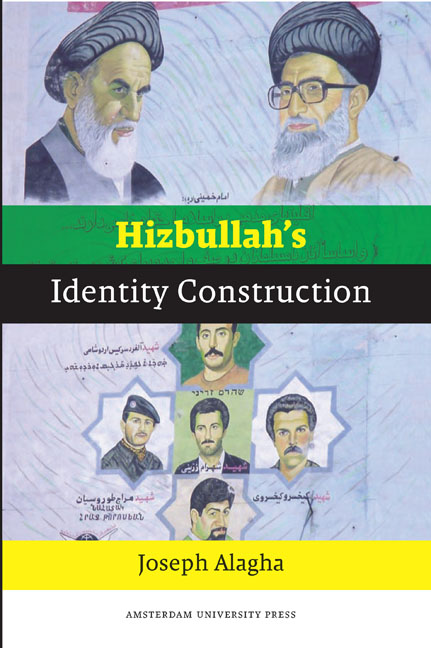Book contents
- Frontmatter
- Dedication
- Contents
- A Note on Transliteration
- Acknowledgements
- List of Abbreviations
- Summary
- Introduction and Analytical Framework
- 1 Tolerance and Discrimination: Ahl Al-Dhimma in the Islamic Order
- 2 Interpretation and Authority: Wilayat Al-Faqih
- 3 Political Violence: Terrorism and 9/11
- 4 Political Violence: Suicide Operations
- 5 From Cooptation to Contestation to Political Power
- 6 The Doha 2008 Accord and its Aftermath
- 7 The Eighth Conclave: A New Manifesto (November 2009)
- 8 Epilogue: Future Prospects – Disarmament and the Peace Process
- Afterword
- Glossary
- Additional Reading
- Notes
- Selected Bibliography
- Index
- Praise for Hizbullah's Identity Construction (1978-2010)
7 - The Eighth Conclave: A New Manifesto (November 2009)
Published online by Cambridge University Press: 19 January 2021
- Frontmatter
- Dedication
- Contents
- A Note on Transliteration
- Acknowledgements
- List of Abbreviations
- Summary
- Introduction and Analytical Framework
- 1 Tolerance and Discrimination: Ahl Al-Dhimma in the Islamic Order
- 2 Interpretation and Authority: Wilayat Al-Faqih
- 3 Political Violence: Terrorism and 9/11
- 4 Political Violence: Suicide Operations
- 5 From Cooptation to Contestation to Political Power
- 6 The Doha 2008 Accord and its Aftermath
- 7 The Eighth Conclave: A New Manifesto (November 2009)
- 8 Epilogue: Future Prospects – Disarmament and the Peace Process
- Afterword
- Glossary
- Additional Reading
- Notes
- Selected Bibliography
- Index
- Praise for Hizbullah's Identity Construction (1978-2010)
Summary
This chapter surveys Hizbullah's identity construction from the time of the propagation of its first Manifesto, the Open Letter in 1985, passing through all of its eight clandestine conclaves, to the publication of its second watershed Manifesto in 2009. I begin by analyzing the Open letter.
THE SALIENT POINTS OF THE OPEN LETTER
Hizbullah's political declarations, al-‘Ahd, the discourse of its leaders and cadres, and most notably the Open Letter specify the constituents of the party's political ideology: oppressors and oppressed; Islamic state; relations with Christians, anti-Zionism, pan-Islamism, anti-imperialism, and jihad and martyrdom. Hizbullah employs Qur’anic legitimization of its political ideology in the form of Qur‘anic verses to justify its stance. One may notice that only the first section of the ‘Open Letter’ explicitly refers to Hizbullah's religious ideology: belief in Shi‘a Islam, wilayat al-faqih, and jihad in the way of God.
OPPRESSORS AND OPPRESSED
The concept of oppressors (mustakbirin) and oppressed (mustad‘afin) is central to a proper understanding of Hizbullah's political ideology. Although Hizbullah seems to employ an exclusivist discourse in which it classifies people according to the Qur’anic classification/dichotomy of Hizbullah (The Party of God) (5:56) or Hizb al-Shaytan (The Party of the Devil) (58: 19), Hizbullah uses the Qur’anic term or Islamic expression of oppressed and reproduces it as an all-inclusive concept in order to uphold political and social justice. On the face of it, it appears that Hizbullah is using Marxist terminology, which is translated or interpreted in Islamic terms along the lines of economic, political, and social justice, thus producing a kind of Islamic socialism, as some scholars have claimed.
However, Hizbullah clearly argues in the Open Letter and its political declarations that its friends are the oppressed of the entire world, irrespective of their color, race, or religion. The party interprets and applies the contemporary concept of mustad‘af by stressing that it is a Qur’anic concept that came to prominence with the advent of the Islamic Revolution. Hizbullah emphasizes that this usage conveys and is in conformity with its identity as an Islamic jihadi movement struggling to address and redress the injustices that the oppressed suffer from.
- Type
- Chapter
- Information
- Hizbullah's Identity Construction , pp. 155 - 176Publisher: Amsterdam University PressPrint publication year: 2012



